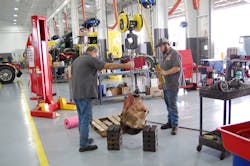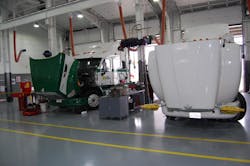NASHVILLE. With the shortage of technicians growing more acute by the day, calls are growing for a wholesale overhaul to the recruiting process for this critical industry profession.
“The technician shortage is going to get catastrophically worse,” Doug White, VP of maintenance for national armored car fleet Dunbar Armored and the newly installed general chairman of the Technology & Maintenance Council (TMC), told Fleet Owner.
One of the problems is generational, affecting the U.S. workforce as a whole, with 77 million “baby boomers” retiring over the next two decades, with only 46 million new workers set to replace them, according to numbers tracked by the American Society for Training and Development (ASTD).
“That’s a deficit that is only going to continue to grow,” White explained here during TMC’s annual meeting. “We can’t fix it tomorrow; it’s going to take long-term work. What we need to do is start recruiting in the grammar schools; we need to get in front of them there because by the time they’ve completed two years of high school, we’ve lost them.”
“Finding and keeping technicians is one of the industry’s biggest challenges today,” noted Terry Clouser, VP of fleet services for leasing company Fleet Advantage, in a separate interview.“Technicians and their ongoing training needs are of the utmost importance for this industry; that includes looking at everything from pay and benefits to working conditions,” he said. “We also must continually train them; that’s a cost the industry can’t afford to do without. Trucks are only going to get more complicated; on average there are 13 computers on board a commercial truck today and only more will be added.”
According to the U.S. Bureau of Labor Statistics (BLS), the trucking industry will need to recruit 67,000 new technicians by 2022 just to meet demand and replace retirees – a number not including the more than 75,000 new diesel engine specialists the agency anticipates will also be needed six years from now.
Yet finding, training and keeping technicians – whose skill set requirements are becoming more intricate due to the growing complexity of trucks and related freight equipment – is all the harder due to the design of the U.S. educational system, which prioritizes attending college over the pursuit of a vocational career.
Kevin Tomlinson, director of maintenance for South Shore Transportation Co. and TMC’s outgoing chairman, noted that disconnect back in September at the annual FTR Transportation Conference, especially since truck driving and technician careers now offer better pay.
“We need to let them know what we as an industry can offer them,” he explained during that panel discussion last year. “Kids can go to college, come out $150,000 in debt, and go work at McDonalds. Or don’t go to college, come drive or turn wrenches for us, and start out making $55,000 with no debt.”
That’s why White emphasized that the trucking industry “needs to get in front of high school guidance counselors” who constantly push “college, college, college” to the detriment of vocational careers.
“We need to get in front of them and the parents,” he added. “We need to let them know about the opportunities in the vocational fields.”
About the Author
Sean Kilcarr
Editor in Chief
Sean Kilcarr is a former longtime FleetOwner senior editor who wrote for the publication from 2000 to 2018. He served as editor-in-chief from 2017 to 2018.

